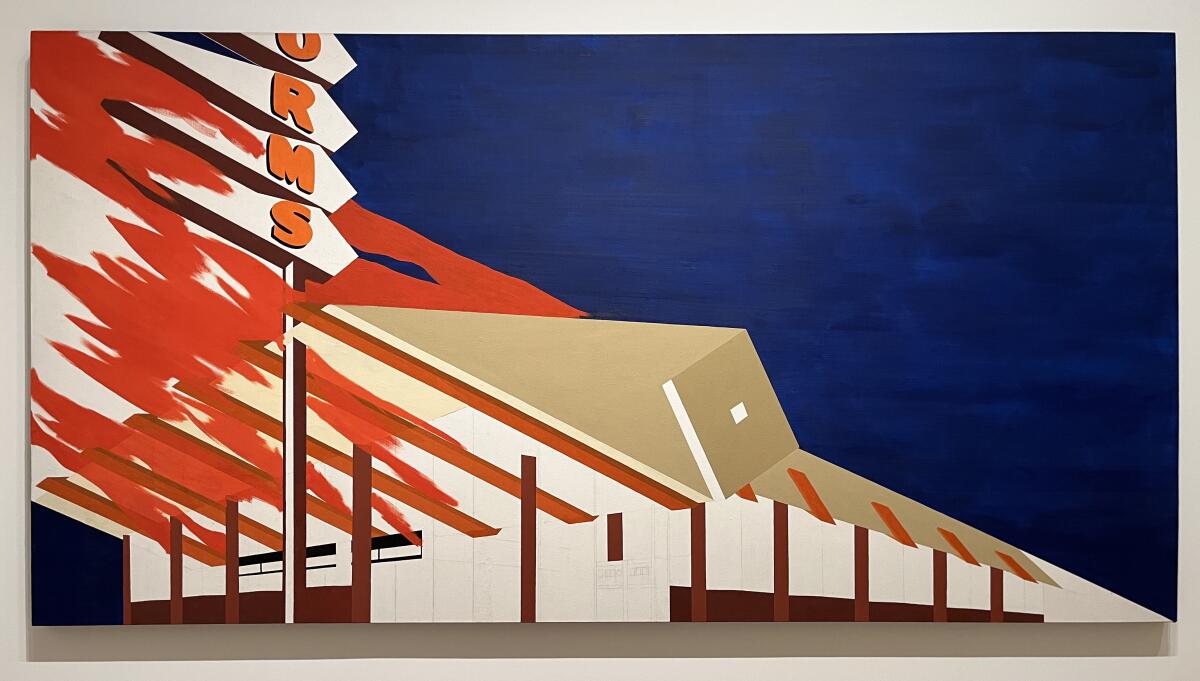
It could be the end of an era for a place that came to define a certain architectural and food aesthetic for Los Angeles.
If all goes according to plan, the iconic sawtooth “Norms” coffee shop sign on La Cienega Boulevard — one of L.A.’s few remaining examples of Googie coffee shop architecture of the midcentury — would be replaced by “Canes.” Goodbye to the retro diner known for steak and eggs, hello to a new outpost for Raising Cane’s fast-food chicken strips.
The other Norms locations around Southern California would still operate under the proposal. But the La Cienega location is iconic. It was the subject of a famous Ed Ruscha painting, “Norm’s, La Cienega, On Fire” and was granted historic landmark status for its space-age looks so associated with post-war L.A.
The restaurant group that owns Raising Cane’s — a fast-food chicken chain — owns the space that houses the iconic Norms location and plans to change the location to a Raising Cane’s in 2027, when Norms’ lease of the space ends.
“Raising Cane’s plans to keep the legacy of Norm’s alive and maintain — forever — the iconic Googie-style architecture made famous by Armét & Davis when we begin improvements to restore the property and serve craveable chicken finger meals to the L.A. Community,” Raising Cane’s representatives said in a statement to The Times.
The company shared a rendering of the new plan for the space with The Times. The main alteration is the change of the iconic sawtooth pennant neon sign to say “Cane’s” instead of Norms.

Because the Norms location has been a historic L.A. monument since 2015, Raising Cane’s has to present their plan before the Los Angeles Cultural Heritage Commission. It is set to present to the commission on Dec. 5.
But some Angelenos are pushing back against changing the restaurant — even if Raising Cane’s does not disturb the site’s architectural structure.
“The idea of transforming Norms from a sit-down restaurant, family friendly, affordable to a place to go to get fried chicken is astonishing to me,” said Kim Cooper, one of the two people behind Esotouric’s Secret Los Angeles.
Cooper discovered the change as she looked through the upcoming agenda for the Los Angeles Cultural Heritage Commission. She noticed Raising Cane’s was seeking to change the usage of the space.
“It is so much more than a building. This is a place that has been open 24 hours a day… Norms is part of people’s lives and has been for 67 years, which in L.A. is basically a millennium,” Cooper said.
Cooper encouraged Angelenos to show up to the Cultural Heritage Commission’s December hearing to express their displeasure at Norms becoming a Raising Cane’s.
Norms La Cienega was designed by Louis Armet and Eldon Davis in the famous California “Googie” style in 1957.

The restaurant’s Googie style is a futuristic architecture mode that started out of Southern California and featured sharp geometrical shapes, sweeping curves and bright, sometimes neon, lights. The style was often used on gas stations and coffee shops.
“Norms is in the same realm as the Manns Chinese Theater and Panns and the Hollywood Sign. It’s so iconic to Los Angeles,” said Damian Sullivan, a television producer and historian of “roadside” architecture.
The first Norms was opened in Hollywood by the eponymous former owner, Norm Roybark, in 1949, with the iconic La Cienega location first opening its doors in 1957. Roybark sold the company to CapitalSpring in 2015.
The chain currently has 24 locations in Los Angeles, Riverside and Orange counties and is even opening a spot in Las Vegas.
Norms did not immediately respond to a request for comment.